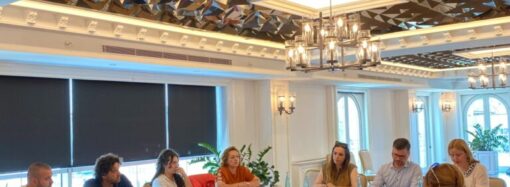European Movement in Albania in partnership with Slovak Foreign Policy Association, with the support of the Ministry of Environment and Ministry of European Integration organised on 16 December 2015, the final session of Working Group IV, with topic: “Protecting Environment through Criminal Law”.
Ms. Mona Xhexhaj, Coordinator of National Convention on European Integration, EMA, during her opening speech assessed the organized sessions in the frame of Working Group Environment, emphasizing the achievements reached and the objective for the last meeting. While explaining the Convention’s focus and the cooperation with Slovak partners, she stressed out as the main aim the creation of collaborative bridges for a consistent and sustainable dialogue between state institutions, civil society actors and interest groups in the framework of Albania’s integration process in EU. According to Ms. Xhexhaj the first three sessions of this WG, were concentrated in main issues of environment in Albania, such as :the gaps in Albanian legislation on environmental protection and obstacles in full implementation process, the lack of inter-institutional cooperation and protection policies to reach European standards, including also the lack of information and awareness for the citizens and the minor pressure coming from the media or other organizations interested in environmental protection in Albania. Implying that the Convention has as a peculiar feature the inclusiveness, Ms. Xhexhaj underlined the fact that there was a specific reason why some previous sessions were organised in other cities different from Tirana, focusing so in those cities in which the human activity, industrial, economic and environmental problematic needs special attention.
Furthermore, Mrs. Erinda Misho, representative of National Environmental Agency during her speech was concentrated mainly on the objectives and functions of the NEA, as the responsible authority defining the requirements for environmental permissions. In addition Mrs. Misho mentioned as an important task the adoption of National Environmental Monitoring Programme and the monitoring process of environment, preparation and publication of annual reports, establishment and management of Registry on the Discharges of Pollutants in Albania, the access of public opinion to information etc. According to Mrs. Misho, the finalisation of Registry is a novelty, due to the fact in this register are processed the data of Self-Monitoring reports of 444 subjects in 2015. Furthermore Mrs. Misho stressed the online publication of Transparency Programme, which is updated every three months, followed by the publications of Registry of Inquiries and Answers on Environmental Information, underlining that 25 inquires have been made until now. To conclude she identified the achieved results of NEA during 2015 such as the finalisation of Maps on water quality, and the location of nature indicators such as air, noises or forests, maps of subjects licensed with A or B permission in Tirana and licensed HEC. Mrs. Misho emphasised transparency as the main goal of NEA and showed the readiness to give to the public a full access on information, reports and publications made by this institution. In addition she said that to improve the environmental procedures and policies, a stronger and wider cooperation between different actors is essential.
Ms. Holta Ymeri, Working Group Expert started her analysis stressing that in developed countries such as EU member states environmental protection has reached high standards. While the public debate in global levels is concentrated mostly on climate changes and urgent measures needed to prevent this phenomenon, Albania has remained behind even in implementing the preliminary elements of environmental protection. A good example to show this difference between Albania and other developed countries is the case of Mexico Bay (Deep Water Horizon 2010) and the course taken there compared with the case of explosion of oil wells in Fier from Bankers Petroleum. The comparison demonstrated that measures taken from the Albanian government were really light (temporary suspension of activity) and during the process there were little transparency and no information about the consequences of environment in long term after the accident, on relevant responsibilities and conclusions from the investigation. After that, another comparative analysis was made between EU legislation and the Albanian one, on environmental protection. The Directive 2008/99/EC, on environmental protection through penal legislation, provides a list of several environmental infringements which are treated as crime environments by Member States. This list is one of the most essential innovations on the field of environmental protection in EU. Another interesting feature of the Directive is that strengthens the protective system of environment by providing as environmental crimes even the offences with grave guilt and also that the companies, whose name these crimes are made will be sentenced with several penalties such as: administrative measures (fees, temporary suspension, not given the right to sign contracts with state etc,). Penal Code in Albania gives another picture of environmental protection. If we analyse article 201 and 203 of the Penal Code, it is seen that only air pollution is penalized, but the land pollution or other damages of fauna and flora are not included and not protected by the law. Furthermore the article 202 of PC handle in a limited way the activity of toxic and radioactive waste transportation which pass and are deposited in Albania, but this article does not provide how to deal with the all waste management process. Another gap mentioned by Ms. Ymeri, is that Penal Code does not include specific articles on managing in an organic way the dangerous industrial activities, in contrary with the EU legal framework which manages and penalises such activities in environmental crimes cases. To conclude, the Albanian legislation and more specifically the Penal Code are really limited and not in accordance with European standards when it comes to environment and its protection. This is why the initiative to draft a law in empowering and to change the penal legislation about the environmental protection is assessed as a positive step to be taken.
Mr. Ondrej Koporec, Expert of Environmental and KBRN substances crime at Ministry of Home Affairs of Slovakia analysed in details the penal legislation of Slovakia. He underlined that 7 year ago, environmental crime was considered a major threat in Slovakia, and in most of the cases the reasons behind this crime are economic motivation due to lower costs for the business and the sanctions are not heavy. In 2010 although EU required to Slovakia a transposition of EU directive concerning this topic, but Slovak state answered that its national legislation had not need for changes because was in harmonisation with EU legislation. After the investigation in 2014, it was seen that in fact Slovak legal framework had several gaps and an approximation with EU legislation was a necessity. Regarding some activities considered by EU legislation as illegal in Slovak legislation the concrete measures were missing, for some others adjustments in sentences were needed. Due to this fact, Slovak legislation was amended in accordance with EU assessments and as a consequence EU legislation assisted in improvement of the Slovak legal framework in environmental protection field. To the expert the most common offences are theft of timber, poaching and violation of Flora and Fauna. According to Mr. Koporec, an essential element in protecting the environment is the Assessment of Environmental Damage, which consists of in summing up the ecological damage plus asset damage. The way of how to calculate the ecological damage could be determined by law or other legal regulations issued under the law, but in most of the cases it can be used also the professional opinion if needed or in other more complicated cases even the expert valuation. The asset damage is linked directly with the real loss of the asset rights plus costs of restoring the environment to its original state. In cases of damage or endangerment of the environment the sentences vary from 3 years in prison to 8 years, if protected areas are damage. According to his data Mr. Koporec said that there are around 15 cases of environmental damage every year in Slovakia. Although there are some important issues in prosecuting the environment cases in penal ways, such as: it is hard to identify the offenders, insufficient interest of prosecutors and police, need of higher level of expertise in investigation, there is no cooperation among law enforcement agencies and there is a high level of corruption.
In the second part participants discussed over their concerns in how to protect the environment in Albania and they analysed some of their ideas that could help in the improvement of the situation. Some of the recommendations suggested were the draft of a Environmental Code, increase of sentences for environment cases, improvement of experts capacity, prosecutors and judges themselves, and also a better cooperation between institutions is a must.


















